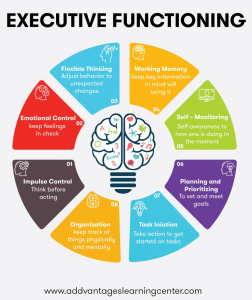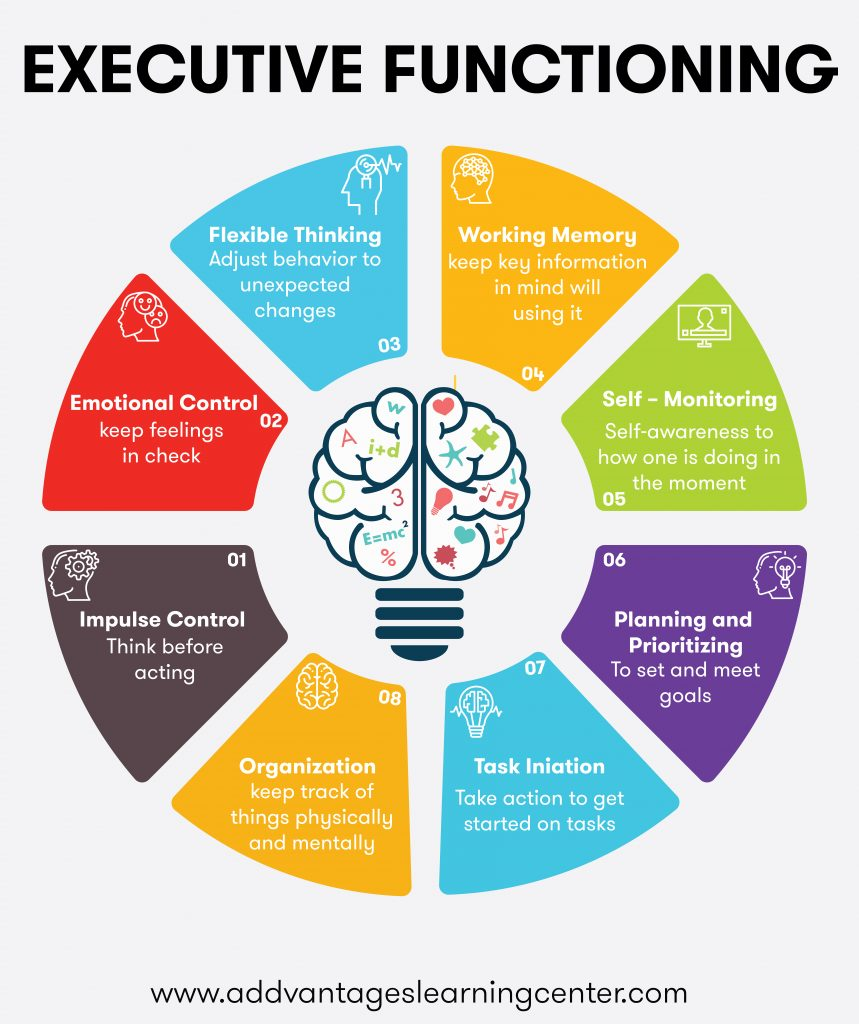Executive function plays a crucial role in cognitive development, guiding how we regulate our thoughts and actions in daily life. Traditionally viewed as an innate aspect of human cognition, recent studies suggest that this complex capacity is significantly influenced by schooling. Researchers have found that children in various environments, particularly those with limited or no formal education, demonstrate varying levels of executive function when compared to their schooled peers. This discovery raises intriguing questions about the effects of cultural cognition on cognitive psychology and our understanding of innate abilities. By exploring these differences, we can better comprehend how executive functions shape behavior across diverse backgrounds.
The term “cognitive control” often arises in discussions surrounding executive function, referring to the mental processes that help individuals manage their thoughts and actions. This concept encompasses skills such as working memory, flexible thinking, and self-regulation, all of which are critical for effective decision-making and problem-solving. As research uncovers the impact of educational experiences on these cognitive capacities, it becomes increasingly clear that cognitive development is not solely an innate quality but also a learned one influenced by cultural contexts. Understanding these distinctions can illuminate the varying abilities observed in children from different schooling systems, prompting a broader discussion about the nature of cognitive processes in different societies.
Understanding Executive Function in Different Contexts
Executive function is often defined as the mental processes that help us plan, focus attention, remember instructions, and juggle multiple tasks successfully. Traditionally, these cognitive abilities have been perceived as innate and universally applicable. However, the recent study from the Proceedings of the National Academy of Sciences challenges this notion. It reveals that executive functions are not solely a product of biological evolution but are significantly shaped by the educational environment in which a child is raised. This finding opens the door to a broader understanding of cognitive psychology, highlighting that what we often recognize as executive function may be heavily influenced by schooling and cultural cognition.
The research indicates that children from rural Kunene, who have limited or no formal schooling, exhibit markedly different executive function capabilities compared to their schooled peers from urban settings like the U.K. or Bolivia. While these children may struggle with tests that require memorization of unrelated words or complex problem-solving, they excel in skills that are culturally relevant, such as remembering livestock details. This observation leads us to reconsider how executive function is assessed and understood across diverse cultural contexts, emphasizing the role of experiential learning over formal education.
The Role of Cultural Cognition in Cognitive Development
Cultural cognition plays a crucial role in shaping an individual’s cognitive development, particularly regarding executive functions. This concept refers to the ways in which cultural factors influence the processes of reasoning, decision-making, and other cognitive activities. In environments where formal education is absent, children develop cognitive skills that are adapted to their cultural needs and everyday experiences. For instance, in Kunene, children’s adeptness at identifying and managing cattle demonstrates a form of cognitive proficiency that is contextually relevant, revealing that their executive functions are not inferior but rather attuned to their way of life.
This research underlines the diversity of cognitive development pathways and emphasizes that academic skills do not encompass all forms of intelligence. The cognitive psychology field must expand its understanding of how schooling effects create a framework for evaluating executive function. This means moving beyond traditional benchmarks and recognizing that cognitive abilities flourish in various cultural settings, shaped by the unique experiences of individuals. A child’s ability to navigate their environment—be it through formalized education or traditional practices—reflects the culture’s influence on cognitive growth.
Innate Abilities vs. Learned Skills in Executive Function
The discourse around executive function has often polarized the concepts of innate abilities versus learned skills. The recent findings from the Kunene region challenge the assumption that executive functions are purely innate traits that every child possesses regardless of their educational background. Researchers highlight a critical distinction: while foundational cognitive abilities exist in all children, the expression of these abilities can vary significantly based on exposure to formal schooling. This distinction raises profound questions about our understanding of intelligence and cognitive measurement.
As the study indicates, unschooled children may not lack for cognitive capabilities; rather, they exhibit skills that are highly relevant to their cultural context. For instance, their proficiency in tasks related to their environment—such as livestock management—demonstrates a form of intelligence that is often overlooked in traditional educational assessments. A more holistic view of cognitive development will necessitate the acknowledgment of both innate abilities and the experiential learning derived from cultural practices, suggesting that executive functions can be as varied as the cultures from which they emerge.
Reassessing Educational Practices Based on Executive Function Insights
The implications of redefining executive function extend into educational practices and policies. As new insights emerge from studies that highlight the significance of cultural context in cognitive development, educators and policymakers must reconsider how they address executive functions within classrooms. Traditional teaching methods often prioritize standardized testing and uniform knowledge acquisition, which may not reflect the diverse cognitive skills children bring from their respective backgrounds. By embracing a more differentiated approach, educational systems can foster environments that cultivate executive functions in ways that resonate with all learning styles.
Moreover, understanding that executive functions are influenced by both innate tendencies and education can lead to the design of curricula that integrate culturally relevant practices. Such curricula would not only cater to standardized educational outcomes but also honor the cognitive strengths inherent in children’s diverse backgrounds. This shift could positively influence cognitive development across various demographic groups, illustrating the transformative potential of culturally responsive education. The need for an adaptive educational framework has never been clearer, especially in a world where globalization continues to blend diverse cultures and learning traditions.
Implications of Executive Function Research for Psychology
The findings from the research on executive function have critical implications for the field of psychology, particularly cognitive psychology. Traditionally, psychology has relied heavily on theories and assessments that are predominantly Western-oriented, which can overlook the variety of cognitive processes present in different cultures. This study exemplifies the necessity for psychologists to diversify their understanding of executive functions beyond the confines of formal schooling and to recognize the cultural representations of cognitive abilities. By broadening the theoretical frameworks used in psychological research, we can gain more inclusive insights into human cognition.
Furthermore, as the research suggests that executive function is not merely a uniform skill set but varies widely between cultures, psychologists can better tailor therapeutic approaches that respect and incorporate cultural narratives into cognitive development. This approach can enhance the efficacy of psychological interventions and assessments, ensuring that they resonate with the lived experiences of individuals from diverse cultural backgrounds. Thus, the dialogue around executive function encourages a shift in psychological practices, advocating for cultural sensitivity and inclusivity in understanding human cognition.
The Intersection of Schooling and Executive Function Development
Understanding the intersection of schooling and executive function development is vital in revealing how educational structures shape cognitive development. The research indicates that executive functions—often linked to classroom success—are derived from the nuances of formal education, including the skills nurtured in academic settings. In schooled environments, children are trained in specific task management and problem-solving techniques that are highlighted in executive function assessments. This suggests that the cultivation of executive functions is, to a significant extent, a product of educational systems that prioritize these skills.
However, the study emphasizes that areas devoid of such schooling can still foster unique cognitive profiles among children that may not be captured by typical assessments of executive functions. Thus, educational systems may need to adapt their methods, recognizing that the skills cultivated outside of formal schooling can be equally valuable. By redefining the parameters of what constitutes effective cognitive development, educational stakeholders can better support children’s learning pathways, focusing on the diverse skill sets that children bring, regardless of their academic background.
Rethinking Human Psychology Through Executive Function Studies
Rethinking human psychology through the lens of executive function studies presents an opportunity to deepen our understanding of cognitive processes in different environments. The recent research clearly illustrates that executive functions cannot be understood purely through a lens of innate abilities or standardized testing practices. Instead, it offers a conceptual framework that emphasizes the cultural context and educational influences that shape these cognitive processes. By embracing this multifaceted perspective, psychologists can develop theories that embody the diversity of human cognition.
Incorporating these insights into psychological research can drive the formulation of new methodologies for assessing cognitive development, fostering an appreciation of various cultural experiences. This can also encourage more equitable practices in educational settings and psychological assessments, aligning them with cultural realities. As we continue to study executive function, we must advocate for a holistic approach that merges biological understanding with an appreciation of sociocultural influences, ultimately pushing the boundaries of what we define as cognitive development.
Expanding Research Horizons in Executive Function
As the field of cognitive psychology grapples with evolving definitions and understandings of executive function, there is a crucial need to expand research horizons. The findings from various cultural contexts reveal rich opportunities for exploring how cognitive capabilities manifest differently across societies. By incorporating diverse populations into psychological studies, researchers can disrupt the narrative that often privileges Western experiences, paving the way for a more comprehensive understanding of intelligence. This expanded research can lead to innovative methods for assessing executive function that are culturally sensitive and contextually relevant.
Future research efforts should aim not only to bridge the gap between innate abilities and learned skills but also to investigate how various educational frameworks impact the cognitive growth of children across different cultures. This includes examining non-traditional learning environments and varied schooling effects on executive functions. As scholars collaborate globally, the insights gained can inform educational practices and psychological frameworks that celebrate diversity in cognitive development, ultimately enriching our understanding of human psychology.
Cultural Variability and its Impact on Executive Function Assessments
The research surrounding executive function emphasizes the need to recognize cultural variability effectively. Traditional assessments often fail to account for the milieu in which a child’s cognitive abilities develop, which can lead to misinterpretation of their potential. While standardized tests may measure specific skills relevant in schooled contexts, they overlook important cultural contexts that shape children’s cognitive abilities. By utilizing assessments that reflect cultural variability, practitioners can obtain a more accurate representation of a child’s executive functions, leading to better support and development pathways.
Moreover, as researchers delve deeper into cultural cognition and its impact on executive functions, it becomes increasingly apparent that skills deemed ‘non-traditional’ are equally valid indicators of cognitive development. This understanding advocates for the incorporation of culturally relevant tasks into assessments, enhancing the inclusivity of evaluations. By fostering assessments that resonate with diverse life experiences, psychologists and educators can appreciate the full scope of children’s cognitive abilities, ensuring that every child’s potential is recognized and nurtured.
Frequently Asked Questions
What is executive function and how does it relate to cognitive development?
Executive function refers to the cognitive processes that enable individuals to control their behaviors, regulate thoughts, and manage actions. These processes are crucial for cognitive development as they help children organize their thinking, problem-solve, and adapt to new situations. Recent research suggests that while executive functions may be viewed as innate abilities, they can be significantly influenced by formal schooling and cultural experiences.
How does schooling affect the development of executive function skills?
Studies indicate that executive function skills can vary greatly between children in schooled vs. unschooled environments. Children with formal education often show higher performance on executive function tasks because these skills are tailored to the cognitive demands of schooling. For instance, tasks requiring memorization of unrelated words might not resonate with unschooled children who have little exposure to such concepts outside of a school context.
Can executive function be measured universally across different cultures?
Measuring executive function across diverse cultures can be challenging, as these cognitive processes are partly universal but also significantly shaped by cultural and educational contexts. Research has shown that the meanings and applications of executive function tasks can differ, leading to variations in performance between groups from schooled and unschooled backgrounds.
What role does cultural cognition play in executive function?
Cultural cognition greatly influences how executive functions are perceived and utilized. For instance, cognitive competencies like memory or problem-solving might manifest differently based on cultural practices related to schooling. Children in rural settings may excel in skills relevant to their environment, such as animal husbandry, which may not align with conventional executive function measures commonly used in Western contexts.
Are executive functions innate abilities, or do they develop through experiences like schooling?
While executive functions may have some innate components, contemporary research emphasizes that their development is heavily influenced by experiences, particularly formal schooling. This suggests that what is often deemed as an innate cognitive ability might actually be a learned skill set that aligns with the demands of educational systems.
How should we approach the study of executive function in light of recent findings?
Given that executive function varies between cultural contexts, researchers should adopt a more nuanced approach that considers both universal cognitive capacities and those shaped by specific cultural and educational practices. This reevaluation may lead to redefining the constructs used to measure executive function and enhance our understanding of cognitive development across diverse populations.
What implications do the findings about executive function have for education?
The findings highlight the importance of tailoring educational approaches to accommodate diverse cultural contexts. Educators may need to recognize and value different forms of cognitive skills outside traditional executive function measures, ensuring that curricula reflect the unique experiences and competencies of all learners.
How can parents support the development of executive function in their children?
Parents can support their children’s executive function development by creating an environment that encourages problem-solving, self-regulation, and adaptability. Activities such as games that involve planning or tasks that promote memory and organization can enhance these skills, complementing what children learn in formal educational settings.
| Key Points |
|---|
| Executive function, traditionally viewed as an innate cognitive ability, may actually depend on formal schooling. |
| A study in the Kunene region of Africa, along with comparisons in the U.K. and Bolivia, highlights differences in development between schooled and unschooled children. |
| Children lacking formal education may perform poorly on executive function tests but are adept in other cognitive tasks relevant to their environment. |
| Research suggests reinforcing the understanding of executive functions as culture-specific capacities rather than purely innate ones. |
Summary
Executive function plays a pivotal role in how humans control thoughts and behaviors, yet recent research suggests this cognitive capability is influenced by educational experiences rather than being an inherent trait. Studies indicate that children’s executive functions vary significantly based on their schooling environments, challenging long-held assumptions in psychology. Recognizing this suggests that our understanding of executive function may need to evolve to better reflect the impact of culture and education on cognitive processes.







